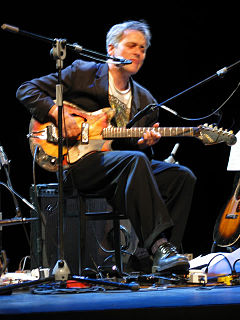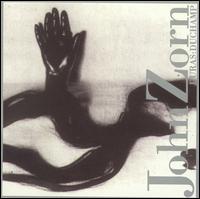
John Zorn is an American composer, arranger, record producer, saxophonist, and multi-instrumentalist. His music crosses genres that include jazz, rock, hardcore, classical, surf, metal, soundtrack, ambient, and improvised music. Zorn incorporates diverse styles and compositional methods in his works, which he identifies as avant-garde or experimental. In 2013, Down Beat described Zorn as "one of our most important composers".

Marc Ribot is an American guitarist and composer.

Masada is a musical group with rotating personnel led by American saxophonist and composer John Zorn since the early 1990s.

The Book of Heads (1978), composed by John Zorn, is a set of 35 etudes for solo guitar. It was recorded and released in 1995, and featured Marc Ribot. The pieces use multiple extended techniques.

Filmworks VII: Cynical Hysterie Hour is a 1989 album by John Zorn featuring music written for a series of Japanese animated shorts that were created by Kiriko Kubo. It features Zorn's first music for cartoons and was originally released on the Japanese Sony label in limited numbers. In late 1996 Zorn finally attained the rights for his music and remastered and re-released the album on his own label, Tzadik, in 1997.

Anthony Coleman is an avant-garde jazz pianist. During the 1980s and 1990s he worked with John Zorn on Cobra, Kristallnacht, The Big Gundown, Archery, and Spillane and helped push modern Jewish music into the 21st century.

The Circle Maker is a double album by John Zorn featuring Zorn's Masada compositions performed by the Masada String Trio and the Bar Kokhba Sextet which was released in 1998 on the Tzadik label.

Taboo & Exile is an album by John Zorn. It is the second album to appear in Zorn's Music Romance Series following Music for Children (1998). Three of the tracks on this recording are from Zorn's Masada songbook.

Music for Children is the first release in John Zorn's Music Romance Series and features three Naked City compositions performed by Zorn with the band Prelapse; a 20-minute composition for wind machines and controlled feedback systems dedicated to Edgar Varese, and a classical chamber music piece for violin, percussion and piano performed by the Abel-Steinberg-Winant Trio framed by a poly-rhythmic etude for percussion and celeste and a lullaby for music box.

The Classic Guide to Strategy is a compilation album by John Zorn featuring his two early solo records The Classic Guide to Strategy Volume One (1983), (tracks 1-2) and the Classic Guide to Strategy Volume Two (1986), (tracks 3-8). The albums were first released on vinyl on Lumina Records in and later re-released on Tzadik Records in 1996 as a single CD. The second track is inspired by the work of Carl Stalling and tracks 3-8 are named after avant-garde Japanese artists. The Classic Guide to Strategy Volume Two also contained the track "Yano Akiko" (5:20) which does not appear on the CD re-release.

Filmworks II: Music for an Untitled Film by Walter Hill features the second release of scores for film by John Zorn. The album was originally released on the Japanese Toys Factory label in 1995 and subsequently re-released on Zorn's own label, Tzadik Records, in 1996. It features the music that Zorn wrote and recorded for Trespass which was not used in favor of a score by Ry Cooder.

Filmworks III: 1990–1995 features the scores for film and advertisements by John Zorn. The album was originally released on the Japanese labels Evva in 1995 and Toys Factory in 1996 and subsequently re-released on Zorn's own label, Tzadik Records, in 1997. It features the music that Zorn wrote and recorded for Thieves Quartet (1993), directed by Joe Chappelle, which was performed by the group that would become Masada; nine cues for Kiriko Kubo's Music For Tsunta (1988); eleven tracks for Hollywood Hotel (1994), directed by Mei-Juin Chen; and thirty-two pieces for advertisements by Wieden & Kennedy.

Filmworks IV: S/M + More features film scores by John Zorn. The album was released in Japan on Eva Records in 1996 and on Zorn's own label, Tzadik Records, in 1997. It features the music that Zorn wrote and recorded for Maria Beatty's The Elegant Spanking, Beatty and M.M. Serra's A Lot of Fun for the Evil One, "Credits Included" written for the film of the same name directed by Jalal Toufic and "Maogai," written for a piano scene in a film by Hiroki Ryuichi.

Filmworks V: Tears of Ecstasy is a film score by John Zorn. The album was released on Zorn's own label, Tzadik Records, in 1996. It features the music that Zorn wrote and recorded for the movie Tears of Ecstasy (1995) by director Oki Hiroyuki.

Filmworks VIII: 1997 features two scores for film by John Zorn released on Zorn's own label, Tzadik Records, in 1998. It features the music that Zorn wrote and recorded for The Port of Last Resort (1998), a documentary directed by Joan Grossman and Paul Rosdy examining the experiences of Jewish refugees in Shanghai and Latin Boys Go to Hell (1997) which was directed by Ela Troyano.

Filmworks XVIII: The Treatment features a score for film by John Zorn. The album was released on Zorn's own label, Tzadik Records, in 2006 and contains music that Zorn wrote and recorded for the romantic comedy, The Treatment (2006), directed by Oren Rudavsky.

Duras: Duchamp is an album of contemporary classical music by American composer and saxophonist/multi-instrumentalist John Zorn consisting two tribute compositions for Marguerite Duras and Marcel Duchamp.

Angelus Novus is an album of contemporary classical music by American composer and alto saxophonist/multi-instrumentalist John Zorn including compositions written in 1972 ("Christabel"), and 1983.

Great Jewish Music: Marc Bolan is a tribute album featuring the music of English singer/songwriter Marc Bolan of the band T.Rex. Produced by Danny Cohen, it was released on John Zorn's label Tzadik Records in 1998 as part of their series on "Radical Jewish Culture", following similar prior tributes to Burt Bacharach and Serge Gainsbourg.

Filmworks XXI: Belle de Nature/Rijksmuseum features a score for film by John Zorn. The album was released on Zorn's own label, Tzadik Records, in 2008 and contains music that Zorn wrote and recorded for film director Maria Beatty's Belle de Nature (2008) and a documentary on the renovation of the Rijksmuseum Amsterdam.




















